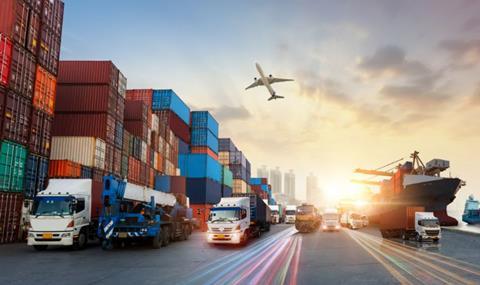
The logistics industry has welcomed the launch of a £7m government-backed fund today (9 January), which is aimed at making freight delivery across the UK more efficient.
The freight innovation fund (FIF), will be awarded to up to 36 small and medium-sized enterprises (SMEs).
The SMEs will work with freight companies to develop innovations that make the movement of goods more efficient, help cut emissions and make the supply chain more resilient.
Roads minister Richard Holden said: “Our freight industry is vital to underpinning the economy and keeps Britain moving, so it is crucial we invest in new innovations to make it greener and quicker.
“This fund will accelerate new ideas and technologies, helping to develop a future pipeline of innovations that can be rolled out to create jobs and allow everyone to get their goods faster and easier.”
Kate Jennings, policy director at Logistics UK, welcomed the launch of the fund by DfT. She said: “Achievement of the UK’s net zero target is a challenge our members are committed to but this will require continued partnership between the government and industry to achieve.
“This innovation fund will be a welcome route for our member organisations to develop and access the technologies needed for goods to be moved in an increasingly green and cost-efficient way.”
Stephen Parker, recently appointed director general of the British International Freight Association added: “One consequence of Brexit and the pandemic has been the spotlight that it has placed on the importance of freight and logistics on the health of the nation’s economy. So, we welcome the Road Minister's and the government's further recognition of the vital role that the freight industry plays in underpinning the economy and keeping Britain's trade moving.
"BIFA members face requests from their clients to demonstrate how they are incorporating environmentally-focused policies into their business activities.
"So, any initiative that may help make the movement of freight more efficient, resilient and greener, is also welcomed by BIFA's members that manage the physical supply chains of so many companies trading to and from the UK; as well as the domestic market.
"BIFA hopes that £7m shared by up to 36 small and medium-sized enterprises will be enough to help them work with industry-leading companies to develop new technology and working practices that enable efficiencies to be developed, which help to reduce emissions across the sector."
The fund will be delivered by the government's innovation agency for cities and transport, Connected Places Catapult, which will also provide access to technical and business support.
Chief executive Nicola Yates, said: “Each year in the UK, we transport 1.6bn tonnes of freight using many different modes of transport, and it has never been quicker or easier.
“The freight sector makes a huge contribution to our economy and contributes significantly to domestic carbon emissions.”
She added: “The fund will help us to work with innovators and industry partners to develop a pipeline of technology and data innovations that will tackle the freight sector’s emerging needs, ensuring that resilience, efficiency and carbon reduction are core to the sector’s future.”
The innovation fund is part of the government’s future of freight plan, the first-ever cross-modal and cross-government plan for the UK freight transport sector, which was launched last year.
The plan sets a strategy for the government and industry to work closely together to deliver a world-class, seamless flow of freight across the UK’s roads, railways, seas, skies and canals.
The fund is looking for ideas and technology that address three key areas. These are:
- a lack of large-scale cross-industry data collection and sharing between different modes of freight transport, such as road, rail and maritime, that could improve efficiencies and coordination
- difficulties in inter-modal transport, such as between rail and road, and ways to improve how large consignments are broken up into smaller ones, which could reduce emissions and traffic
- improvements in freight distribution in ports across different transport modes that could create knock-on benefits with timings, efficiencies, and predictability of the rest of the journey
For more stories tracking the industry journey to decarbonisation see our new Freight Carbon Zero website.














